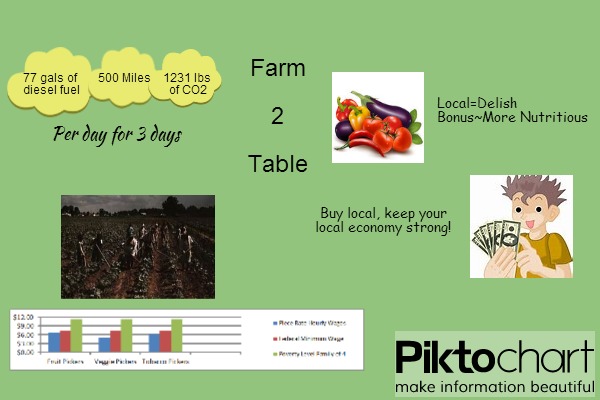Sustainably produced food is grown with the idea that soil should not be depleted of nutrients, water should not be polluted, and the carbon footprint of production and transportation should be minimized. Buying locally grown in-season fruits and veggies are an easy way to make sure you’re doing your part.
When native plants are grown in-season they need less water, fertilizer, and fewer herbicides and pesticides. Not only does this mean that there are fewer chemicals introduced into your food, there is less chance of polluting nearby waterways. These chemicals can also pollute the air through evaporation and overspray.
Smaller local farms use less equipment to produce food. This is one way to lessen food’s carbon footprint. Another way buying locally produced food lessens food's carbon footprint is through shorter transportation distance. The "fresh" produce at the grocery store travels an average distance of 1500 miles!1 The average tractor-trailer which delivers these fruits and veggies uses 77 gallons of diesel fuel and emits about 1230 pounds of carbon dioxide a day for this three day trip.2
Not only do shorter field to table times reduce food's carbon footprint, the food produced is more nutritious and delicious! As fruits and veggies age, they lose flavor and nutrients. In fact, frozen foods are often more nutritious and flavorful than those in the produce section. They generally only have a two to three day lag time from field to processing.
When you buy food from local growers, you keep money in the community, benefitting everyone in the community. When you pay the farmer, he pays the farmhands, and they pay bills and buy in the community; making everyone happy. Migrant farm workers on corporate farms are often paid based on production. This means they are paid based on the amount of produce they pick. Many of them don't even make minimum wage, which is $7.25 an hour (poverty level wages for a family of four is $11.32 an hour). People who are hired by a contractor, as many migrant workers are, are not subject to federal wage laws and may earn much less than that.
There are many advantages to buying locally sourced food. Locally grown produce reduces the carbon footprint of food production. Buying locally means your money is used to boost your local economy. Locally sourced produce is less likely to have contributed to the social inequities of the corporate farms. And, fresher produce is best! It is tastier and more nutritious.
